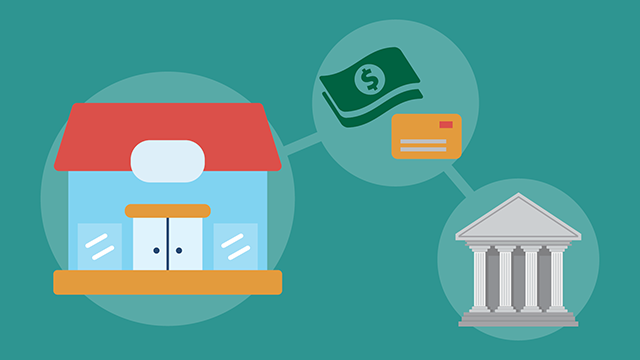The Duty of Credit Rating in Getting Small Company Loans for Business Owners
In the competitive landscape of entrepreneurship, protecting a tiny company loan commonly pivots on the critical aspect of credit report ratings. A greater credit scores rating can open up doors to favorable finance problems, while a reduced score may offer significant barriers.
Comprehending Credit Rating
Credit report are essential mathematical depictions of a person's credit reliability, serving as a critical aspect in economic decision-making for lending institutions. These ratings are originated from a thorough evaluation of a person's credit report, incorporating aspects such as repayment history, credit rating usage, length of credit report, brand-new credit accounts, and kinds of credit rating made use of. Usually varying from 300 to 850, greater scores indicate lower risk to lenders, while reduced scores show greater danger.
The calculation of credit history is executed by credit score bureaus utilizing proprietary algorithms, with the most commonly recognized versions being FICO and VantageScore. Each model might weigh variables somewhat differently, yet they all goal to offer a consistent action of debt danger. A strong debt rating reflects the person's integrity in managing financial debt, making prompt repayments, and keeping a healthy and balanced balance in between credit scores made use of and available credit rating.
It is essential for individuals and entrepreneur to understand their credit history, as these figures can have far-reaching implications past individual finance. Frequently keeping an eye on one's credit history report, correcting errors, and taking on sound financial behaviors can substantially enhance credit report, consequently improving the person's general financial account and creditworthiness.
Relevance for Finance Approval
Recognizing one's debt rating is fundamental, as it plays a significant function in the process of financing approval for tiny services. Lenders utilize credit ratings as a key metric to analyze the credit reliability of candidates. A strong credit report shows a background of accountable economic actions, suggesting to loan providers that the candidate is most likely to pay back the financing on schedule. Subsequently, a high credit scores rating can dramatically enhance an entrepreneur's possibilities of safeguarding a lending with desirable terms, including lower rate of interest prices and even more adaptable repayment options.
In comparison, a low debt rating may signal potential threat, leading loan providers to either decline the car loan application or impose more stringent conditions. This makes it important for entrepreneurs to be mindful of their credit rating standing, as it straight impacts their ability to gain access to capital. In addition, debt scores offer as a standardized measure that allows lenders to enhance their decision-making process, making certain effectiveness and consistency. As local business usually require prompt accessibility to funds for growth and sustainability, preserving a robust credit history ends up being essential. Hence, understanding and managing one's credit history is a vital part of preparing for funding applications and attaining business success.
Elements Impacting Scores
Several variables contribute to the decision of a credit rating rating, each playing a pivotal function in forming a person's credit history account. A high ratio of used debt to offered debt can suggest economic overextension, adversely impacting credit reliability.
Size of credit report additionally factors into credit history estimations, with a much longer credit rating history normally seen a lot more positively. This statistics gives understanding right into the person's lasting economic habits, providing lending institutions a wider viewpoint on their credit report monitoring abilities. In addition, the kinds of credit in operation are considered, as a mix of charge account, such as revolving credit history cards and installment financings, can show the capacity to handle different financial obligations.
Last but not least, current debt questions may influence ratings (pre approval student loans). Regular applications for new credit report can suggest financial distress, hence adversely impacting ball game. Each of these components is vital in the detailed assessment of a credit rating, influencing a business owner's ability to protect a bank loan
Improving Your Credit History
Improving one's credit rating belongs to nurturing a yard; careful focus to essential locations can generate considerable improvements. To start, making sure prompt payments on all credit accounts is vital. Payment history makes up a significant portion of a credit history; therefore, establishing automated settlements or reminders can aid keep consistency. Additionally, decreasing financial obligation degrees is crucial. High credit history application proportions, or the quantity of credit used about the credit limitation, can negatively affect scores. Objective to keep usage below 30% of total available credit history.

Finally, keeping older charge account can positively influence the ordinary age of credit score, which is another aspect in racking up models. While new credit queries must be decreased to avoid momentary rating dips, liable credit scores administration with time will normally lead to rack up renovation, thus enhancing eligibility for beneficial little organization funding terms.
Different Financing Options
Navigating the world of local business funding often requires exploring alternate choices past conventional small business loan. Entrepreneurs with less-than-ideal credit rating might discover these alternatives not only more accessible but additionally customized to their special service requirements. Among one of the most preferred choices are on the internet lenders, which have actually multiplied in recent times. These platforms generally offer faster authorization processes and more adaptable terms than traditional banks, frequently considering factors past credit score scores, such as business efficiency and cash circulation.
In addition, microloans, often offered by nonprofit organizations, provide to tiny businesses and startups. They provide smaller finance quantities with reduced rate of interest rates, making them optimal for business owners who require limited capital.
Billing funding and vendor cash loan are additionally worth taking into consideration. The previous involves selling superior billings company website to a lending More about the author institution at a price cut, while the last gives a bear down future sales. Both choices can enhance capital without the rigid credit score demands of traditional finances.
Verdict

These ratings are derived from a comprehensive analysis of an individual's credit background, encompassing elements such as settlement history, credit score use, size of credit history, brand-new credit history accounts, and kinds of credit history made use of (pre approval student loans). A strong credit scores rating mirrors the individual's dependability in managing financial obligation, making timely payments, and keeping a healthy balance between credit made use of and available credit rating

Comments on “Uncover Hidden Benefits of Pre Approval Student Loans for Students”